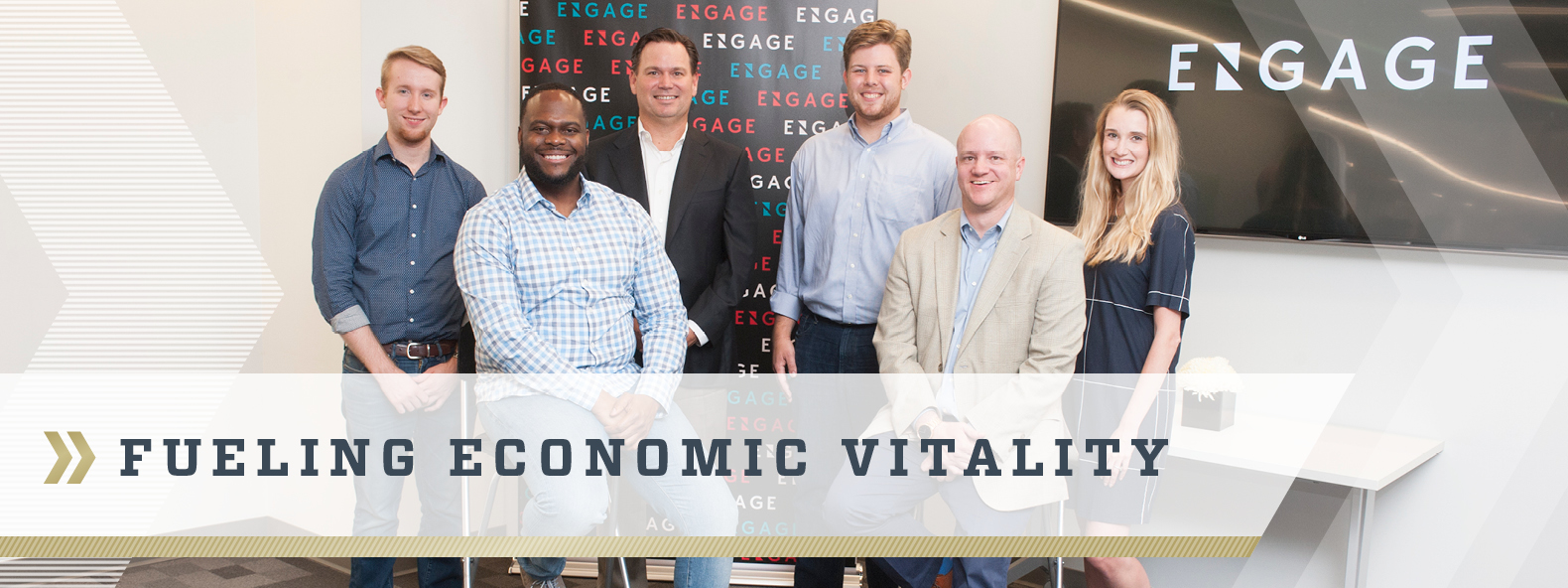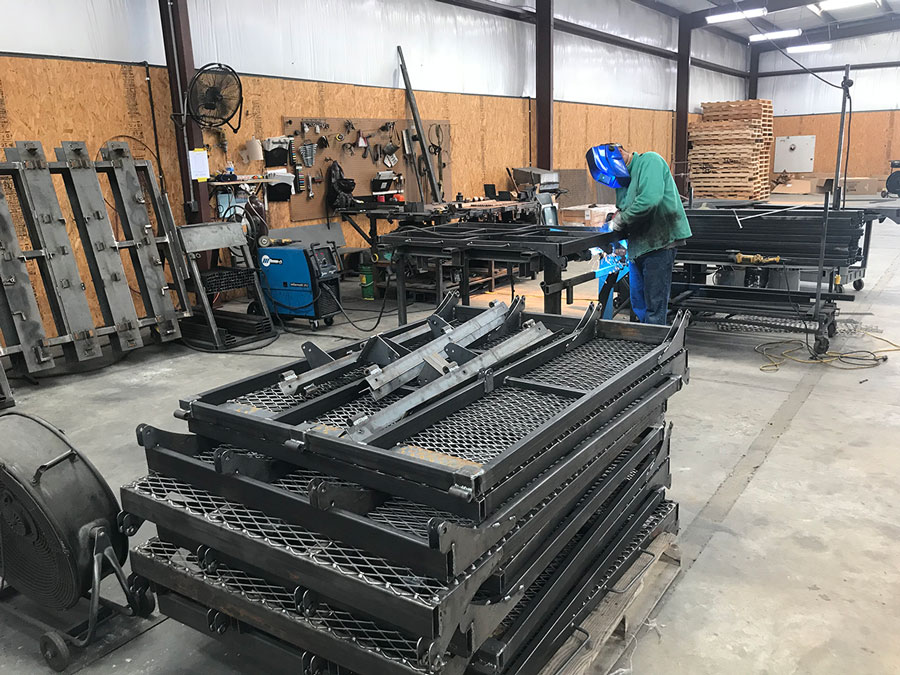
Annual Report 2018 Navigation
Annual Report 2018: Fueling Economic Vitality
Central to Georgia Tech’s mission is developing and nurturing alliances that have a positive economic impact on our state, our region, and our nation. Our faculty and students are passionate about applying their research in ways that stimulate the creation of innovative startups and high-end jobs.
Companies Selected for Engage Ventures
Eight companies are among the inaugural class of Engage Ventures, a new early-stage venture firm created by Georgia Tech and 10 leading global companies. The selected startups are from across the country, and the companies’ leaders include first-time founders and serial entrepreneurs:
- Bee Downtown (working to build healthy, sustainable honey bee communities around the world).
- Cyrano (a leadership communications platform using video messaging to help businesses better connect and engage with employees).
- EmployUs (helping companies hire more referrals by automating the employee referral process).
- Fast Radius (enabling companies to manage the design, engineering, prototyping, and production of end-use parts with digital manufacturing).
- Gauge Insights (a platform for companies to obtain feedback from customers in minutes).
- Sudu (a technology-based logistics company that offers an end-to-end platform to match shippers and carriers based upon route organization).
- The Mom Project (a marketplace and community that connects enterprises with diverse female talent).
- TransRisk (creating products and solutions that help transportation industry participants efficiently manage price risk in the North American freight transportation market).
Headquartered in Technology Square, Engage Ventures is the largest strategic grouping of major corporations in an independent venture firm. The focus is helping startups develop and execute go-to-market strategies.
“What makes Engage unique is the level of access and interaction with our founding corporate partners at the executive and C-suite level to help streamline partnerships and strategic relationships with these startups and growth companies,” said Thiago Olson, managing director of Engage Ventures.
The 10 founding companies contributing capital, expertise, time, and resources in support of Engage include AT&T, Chick-fil-A, Cox Enterprises, Delta Air Lines, Georgia-Pacific, Georgia Power Foundation Inc., Intercontinental Exchange, Invesco Ltd., The Home Depot, and UPS.
Chick-fil-A Opens Technology Innovation Center in Tech Square
Chick-fil-A has opened a technology innovation satellite office at the historic Biltmore, in Georgia Tech’s Technology Square.
The Technology Innovation Center, part of the company’s longstanding partnership with the Institute, emphasizes Chick-fil-A’s commitment to innovation.
“This new facility will provide a dedicated space for Chick-fil-A to collaborate with the bright minds of Georgia Tech and develop technology solutions that will benefit our customers,” said Chick-fil-A Chief Information Officer Mike Erbrick. “Our founder, Truett Cathy, was a true innovator, and the Technology Innovation Center is one of the ways we’re continuing his legacy.”
The 6,000-square-foot space focuses on digital technology, complementing work already taking place at Chick-fil-A’s three existing innovation centers, and is a testament to the company’s desire to enhance the customer experience. Some of the new center’s projects are being tested in restaurants, including the location in Atlanta’s Colony Square.
Chick-fil-A is working with faculty and students to explore design, innovation, and development projects among various majors and disciplines.
During the past five years, corporations have opened more than 20 innovation and technology centers in and near Tech Square, all within a several-block area.
“Along with Chick-fil-A, companies such as Worldpay, Keysight Technologies, and NCR are attracted to Tech Square so that they can access the talent and technologies being developed, and collaborate with Georgia Tech faculty, staff, and students,” said President G.P. “Bud” Peterson. “When coupled with the many startups fostered in the innovative, dynamic environment developed by the Advanced Technology Development Center and the Enterprise Innovation Institute, this has dramatically changed the face and culture of Midtown.”
In addition, Chick-fil-A gives students the freedom to work on different projects, said Abbie Williams, a third-year computer science major.
“We started work on a project on day one,” she said. “They trust us to do what we think is right. We’ve asked would you like us to do this or that, and they tell us to do what we think is best. It’s empowering.”
Delta Opens Advanced Manufacturing Pilot Facility
Nearly three months after opening its Global Innovation Center in Tech Square, Delta Air Lines cut the ribbon on its new Advanced Manufacturing Pilot Facility on 14th Street in a special ceremony in summer 2017.
“We’re really excited about the partnership with Delta,” said President G.P. “Bud” Peterson. “This facility is a little different. Our students, faculty, staff, and researchers will be able to develop products, and it provides Delta an opportunity to collaborate with its partners.”
Made possible by a $3 million gift from the Delta Air Lines Foundation, the facility was designed to be an integrated physical and cyber manufacturing technology testbed as well as a demonstration and teaching facility. The Advanced Manufacturing Pilot Facility will be a flagship component of the Georgia Tech Manufacturing Institute as a location where early-stage concepts can go from idea to reality.
“Georgia Tech is a world-class institute, and we’re really blessed to have you in our hometown,” said Gil West, senior executive vice president and chief operating officer for Delta.

Darren Green, owner of The Old Wood Co. in Asheville, North Carolina, sought SETAAC's assistance to help his company better compete with low-cost foreign imports. Photo by Travis Bell.
Federal Funds Support International Competitiveness
The U.S. Economic Development Administration (EDA) has awarded $13.3 million in federal funds to support 11 Trade Adjustment Assistance Centers (TAACs), including the Southeastern Trade Adjustment Assistance Center (SETAAC) at Georgia Tech, which will receive $1.3 million.
TAACs work to support a wide range of technical, planning, and business recovery projects that help companies and the communities that depend on them adapt to international competition and diversify their economies. The grants are for the second year of a funding cycle that runs from 2016 to 2021.
SETAAC — a program of Georgia Tech’s Enterprise Innovation Institute (EI2) — works with companies throughout Georgia and the Southeast. SETAAC provides up to $75,000 of matching funds for third-party consultants to help guide a client’s economic recovery. Eligible manufacturing firms contribute a matching share to create and implement their respective recovery plan.
In Fiscal Year 2017, SETAAC worked with 45 clients, and helped those firms generate more than $9.7 million in sales, and help save or create 143 jobs.
Georgia Tech Invests in Rural Georgia’s Success
Helping rural areas of Georgia foster sustainable, competitive economies is among Georgia Tech’s highest priorities.
The Georgia Manufacturing Extension Partnership (GaMEP) and the Economic Development Lab are prime examples of this commitment. GaMEP provides expertise to help its clients improve their competitiveness in the global market through organizational growth strategies and operational excellence practices. The Economic Development Lab helps governments, communities, foundations, entrepreneurs, and small businesses foster value creation by applying innovative ideas, technology, and policy to initiatives focused on economic growth.

The Georgia Manufacturing Extension Partnership at Georgia Tech worked with Super Lawn Trucks (whose Fort Valley, Ga., plant is shown above) to help the company address increasing demand for solar-powered equipment. As a result, the company’s Super Solar Truck is successfully meeting increased consumer demand.
GaMEP: Central Georgia’s Peach County is home to Super Lawn Trucks, a Fort Valley-based company that provides custom enclosed truck bodies and tool storage systems for the lawn and landscape industry. The company engaged with GaMEP to help with its efforts to address market demand for solar-powered equipment. To address a growing trend of local governments banning gas-powered lawn equipment due to noise and gas fumes, GaMEP worked with Super Lawn Trucks to further its goal to build a truck to support a three-person crew using all battery-powered equipment. GaMEP evaluated commercial battery powered equipment suppliers for partnership and collected electrical consumption data for hand-powered equipment, in addition to studying the estimated daily electric power needs for a three-person lawn maintenance crew.
As a result of GaMEP’s research, analysis, and recommendations, the company’s Super Solar Truck is successfully meeting increased consumer demand. The company also is developing a concept-stage, second-model solar truck designed to support a five-person crew.
Economic Development Lab: At the state’s northern border, the Fannin County Development Authority (FCDA) completed a speculative facility in 2017 to market to prospective businesses. As built, the 20,000-square-foot-space can accommodate either back office or light manufacturing operations. In order to help attract quality jobs to the community, the FCDA submitted a successful application to the Economic Development Research Program (EDRP) for a labor market study. The Economic Development Lab at Georgia Tech’s Enterprise Innovation Institute (EI2) assisted the FCDA by conducting research and analysis through the U.S. Economic Development Administration’s University Center grant program.
In addition to helping pinpoint other areas of focus in its workforce that had been unaddressed (i.e. aging workforce), the findings from the study have helped the FCDA successfully recruit a company to the facility. The new company will initially begin operation with six employees and potentially grow to 10 employees over the course of three years.
Annual Report 2018 Navigation
(text and background only visible when logged in)
